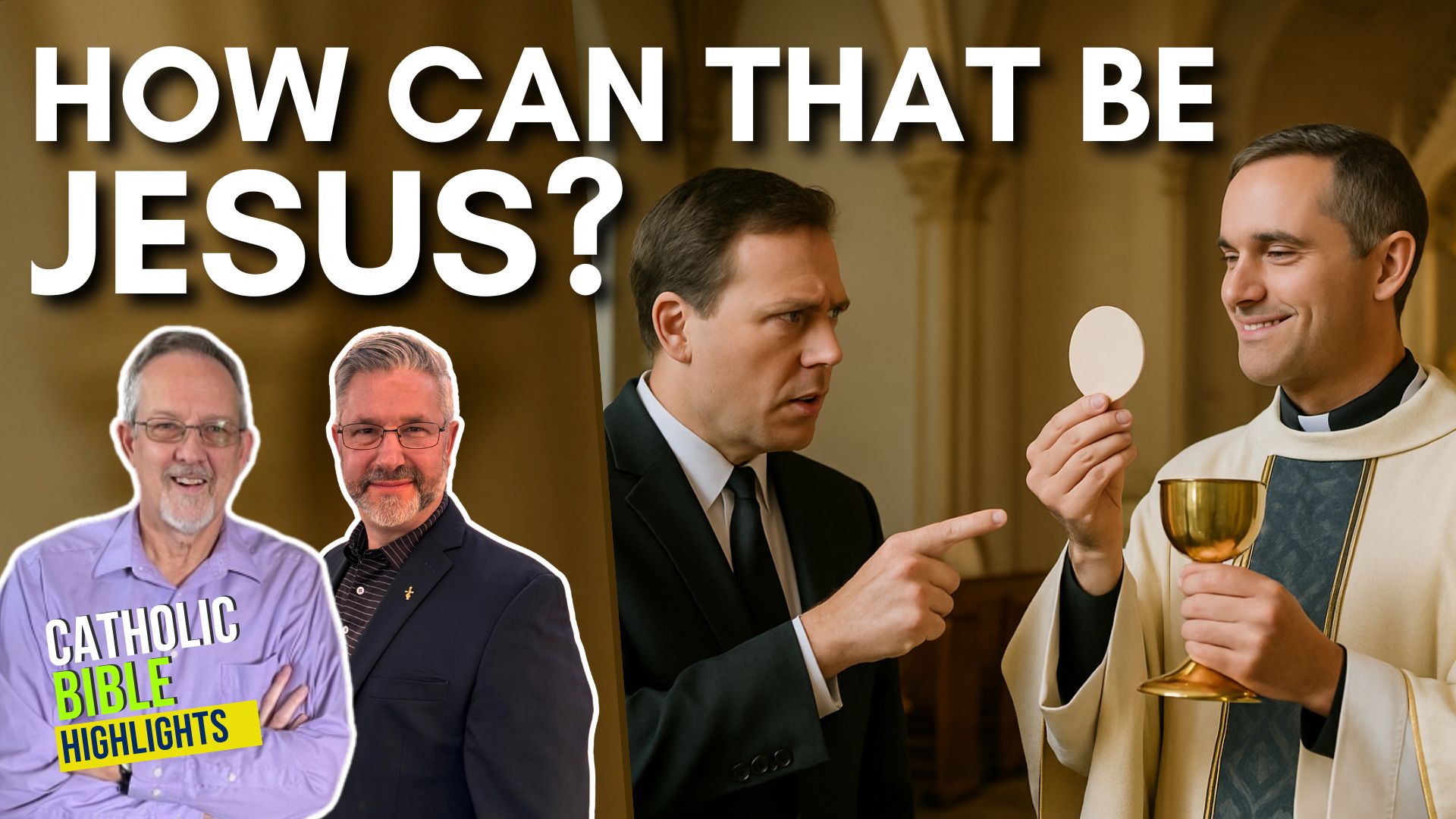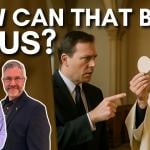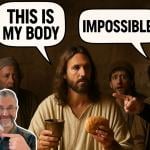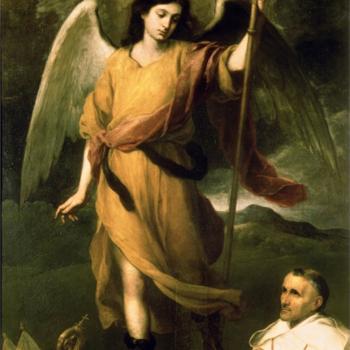
This exchange occurred in the combox of my video, How Can That Be Jesus? (Turretin & the Eucharist) [Catholic Bible Highlights, 5-23-25]. The words of our Reformed Protestant friend will be in blue.
*****
It is very important to know what the other is arguing before making a long video which respectfully most of it has little to do with the argument.
I have answered Turretin in-depth in reply articles 14 times now; the last four concerning the Eucharist. This came from one of the four. Most had little to do with his larger argument; I agree, because I was taking off from his comments about the “impossibility” of God being bodily present in the bread and wine and constructing a demonstration of all the different types of God’s presence in the Bible. So it’s a massive response to that one aspect of his argument. In that sense I readily agree that I wasn’t dealing with his entire argument. I do that across all four of my written responses.
I am not going to suppose all of Turretin’s arguments but will give some of the basics of a Reformed argument against Christ being physically present on earth after the ascension into heaven and before the second coming. I think that will clear up many misconceptions and thus clear up some confusion and false accusations.
Go for it. I so rarely get any responses that it is delightful to find someone willing to engage.
1. Reformed theology (RT) is not claiming that God cannot be present with man at any time. The whole list of how God in his divine nature is immaterially present has little to do with the subject and RT has no issue with it. They might have some slight differences, but they definitely believe in God’s omnipresence and also his special presence with believers by the Holy Spirit.
I agree. My argument was a huge reductio, trying to show that if God is immaterially present in ten ways and materially present in another nine ways, then how can Turretin claim that it’s “impossible” to believe in transubstantiation. It makes literally no sense, and is a universal negative type pseudo-“argument”: which is always a bad move on any sort of debate. Turretin not only claims God doesn’t do what we claim He does at every Mass, but can’t possibly do it: which is an exponentially larger claim and extremely difficult to prove from the Bible.
2. RT has no issue with pre incarnate physical appearances of God (Theophanies) but hold the incarnation in a special place. I do not think God was physically present in the burning bush but that is off topic.
My argument didn’t entail claiming that Reformed Protestants disagreed with all of these sorts of presence. I am explaining my intention with the argument, which you seem to have largely missed. I didn’t claim God was “physically present in the burning bush” either. What I claimed (in my notes for this video) was that it fell under the category of “Divine Presence Involving Physicality” and that “God can be and was present in a special way in matter (the burning bush . . .)”. That’s a different claim from saying that God himself was physically present in the bush. I chose my words very carefully, as I always do.
3. RT has no problem with the incarnation
I never claimed it did. So why would you bring this up? I’m saying that, given your acceptance of the incarnation, why do you think transubstantiation would be impossible?
4. RT has no issue with the in Christ language by Paul and others in he Bible. The issue as we will see is how.
I never claimed that, either. You are assuming a lot of things about either my argument or my intentions for it or about what I supposedly think about Reformed Protestantism (that I don’t). But an e for effort . . .
Okay. So what is the argument? Why are RT so against Jesus being physically (body) now in the Eucharist.
Thanks for explaining! Inquiring minds want to know . . .
1. The first issue is best understood through the Chalcedonian definition. It states, ” one and the same Christ, Son, Lord, Only-begotten, recognized in two natures, without confusion, without change, without division, without separation; the distinction of natures being in no way annulled by the union, but rather the characteristics of each nature being preserved and coming together to form one person and subsistence, not as parted or separated into two persons, but one and the same Son and Only” (From the Council of Chalcedon 451).
Thus, Jesus is one person in two natures, divine and human. And these two natures are not confused, do not change, are not divided or separated. He still has two natures today. If Jesus Christ is body is present in the Eucharist then we are saying that Jesus’ human nature is present in the Eucharist.
That’s not what we believe; rather, that He is present, “Body, blood, soul, and divinity.” But it’s a sacramental presence, which is a different mode of presence. We can no more separate the two natures in the Eucharist than we can when we talk about Mary being the Mother of God (Theotokos). Mothers aren’t parents of natures but of people.
It is argued that a human nature can only be at one place at a time and has boundaries and a limited scope (amount). So how is Jesus Christ human nature in heaven and on earth?
Well, it’s the whole Jesus, not just the human nature, but it is His physical body, which is the human nature. Why do you think this is impossible? How could the fish and the loaves be multiplied? These things simply aren’t impossible for God. The prior problem is that Turretin and many (most?) Reformed think that miracles ceased. So transubstantiation is made “impossible” by ruling out a category and a possibility, rather than by theological or biblical argument.
How can He have a physical body, yet walk through walls? The Eucharist is neither theologically nor logically impossible for God to do.
And how do millions of people eat his human body but it is not used up?
Because it’s a miracle. How can one believe that miracles ceased when the Bible never said that this would be the case?
Again, it is said to be a natural limitation of a human nature that we cannot be at two places at once and that we have a limited amount of body.
But we are finite, created human beings. God the Son is not that.
The human nature does not change or morph into a divine nature per Chalcedon. So how does this happen? You can say it is a miracle but that does not really help unless one gives some sort of explanation on how a human nature is multipresent.
Why do we even have to explain it? It’s what Jesus taught, so we believe it. He held bread in His hand and said “this is my boy” and he held a glass of wine and said it was His blood. Then He said that if we don’t partake in both we have no life in us. The people who were at Chalcedon believed, for the most part, believed in the transformational character of the Eucharist, according to Protestant historian Philp Schaff and many others. They saw no conflict here; only Calvinists do, 15 centuries after Christ.
God became flesh to suffer and die as a human. The divine nature did not die. Jesus’ human nature died.
No; Jesus died and He had both natures. We don’t say that a “human nature” or in our case that a “soul died.” We say that a human being died.
But Jesus is one person and so God died on the cross. The Divine nature did not change so it could suffer in the incarnation. Why does the human nature change in the Eucharist?
Because God so willed it. Bread and wine can become God, just as we can be “partakers of the divine nature” too.
2. Secondly, after the ascension the disciples were looking up. Acts 1:10-11 describes what occurred. “10 They were looking intently up into the sky as he was going, when suddenly two men dressed in white stood beside them. 11 “Men of Galilee,” they said, “why do you stand here looking into the sky? This same Jesus, who has been taken from you into heaven, will come back in the same way you have seen him go into heaven.”
Yes, in the sense of the incarnate Jesus. He came with a human body the first time and He will do so the second time with a glorified human body. Sacramental presence is different in kind from that.
Another part of the argument is Jesus will return bodily at the second coming. He does not come back in between.
The first doesn’t rule out the possibility of the second. This is simply the usual hyper-rationalistic “either/or” Reformed thinking, whereas the Bible is “both/and.”
thus, Jesus in his manhood is sitting at the right hand of the Father (or in heaven) waiting for the appointed time of his second coming. He is not on earth because that would be a second coming. He cannot be in two places or more at once. And he only has a limited amount of physical body.
Who says He can’t do that? If Jesus says that He can and does and Calvin and Turretin and you disagree with Jesus, then I go with Jesus’ opinion.
3. Now many in the reformed theology camp ascribe to spiritual presence. At least one version of that sees a real presence of Jesus in the Eucharist but not on earth. So instead of Jesus coming down, believes are mystically brought up to heaven in the Eucharist to feed on the body and blood of Jesus.
None of which is in the Bible, so the sensible question is, “why would anyone believe that?”
This is not all of the RT but it is a view of the RT.
And it’s wrong and unbiblical, whatever it is.
That understanding would clear up many of the issues above. Jesus would be present in one location (not multi present at one time) and he has not come back to earth before his second coming (in his human nature). I ascribe to this view in some sense.
Paul says, “The cup of blessing which we bless, is it not a participation in the blood of Christ? The bread which we break, is it not a participation in the body of Christ?” (1 Cor 10:16, RSV),. He never says this is in heaven. You merely arbitrarily assume that, to make sense of your own false dilemma that really is none at all. The author of Hebrews also wrote:
Hebrews 13:10-12 We have an altar from which those who serve the tent have no right to eat. [11] For the bodies of those animals whose blood is brought into the sanctuary by the high priest as a sacrifice for sin are burned outside the camp. [12] So Jesus also suffered outside the gate in order to sanctify the people through his own blood.
That’s not in heaven either. And it’s the same as “the table of the Lord” that Paul refers to in 1 Corinthians 10:21.
There is still mystery in the doctrine of communion. I have some affection and almost want to believe in a Lutheran or Eastern Orthodox type of view of real presence.
Glad to hear that. Perhaps my arguments can make you consider our view as a possibility.
I am not big on the Aristolean [sic] philosophy involved in the RC version.
That’s not of the essence of it. It was merely tool to help us understand substance and accidents in greater detail. But the majority of the fathers already had a transformational view of the Eucharist by the 4th-5th centuries some 500-66 years before Aristotle began being known in the west.
But what keeps me from a complete ascribing to the view is I think the RT argument above holds some real weight.
I think if you examine its premises again you may have less confidence in it.
But again it is important to know and steelman an opponent’s argument. Very little of the video actually deals with the argument.
I have not created any straw man (which is the term, not “steel man”), as explained. Thanks so much for watching the video and interacting. God bless you.
Photo Credit: copyright Catholic Bible Highlights, 2025.
Summary: Detailed, substantive, civil dialogue with a Calvinist on reasons why Reformed Protestants reject the real bodily (corporeal) presence of Jesus in the Holy Eucharist.













